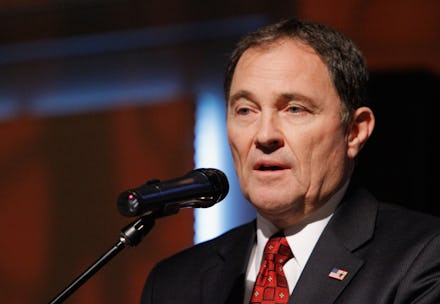Utah's Republican governor just issued a mask mandate

Though he lost his re-election bid, President Trump succeeded in a way that will outlast his administration: politicizing the coronavirus pandemic. In part because of Trump's effective though false messaging that the deadly virus was an overblown political hoax, Republicans and Democrats on Capitol Hill have yet to come together to pass a second comprehensive relief package for U.S. residents, delaying an economic recovery and putting the lives of millions at risk.
That stubbornness has seeped out from Washington, D.C., and down to the states, where there's been a trend of Democratic-led states taking early and severe steps to protect their populations, while many Republican states have prioritized liberty and the economy en route to spiking cases. But that trend shifted slightly Sunday night, when Republican Utah Gov. Gary Herbert announced that he would issue a mask mandate in his solid-red state.
"Masks do not negatively affect our economy, and wearing them is the easiest way to slow the spread of the virus," the governor said. "We cannot afford to debate this issue any longer. Individual freedom is certainly important, and it is our rule of law that protects that freedom." Herbert compared the mask mandate to other science-based laws that safeguard personal and public health: "Laws are put in places to protect all of us. That's why we have traffic lights, speed limits, and seatbelts, and that's why we now have a mask mandate."
In addition to mandating mask usage, Herbert also called for halting social gatherings until Nov. 23, stopping all non-classroom-related extracurricular activities for children, and instituting weekly COVID-19 testing for college and university students. "In my 11 years as governor, I have seen Utahns do remarkable things," the governor said in a tweet. "We have overcome extraordinary challenges and great adversity. I implore you now to do all you can to stop the spread. It is time for Utahns to unite in this response and bring healing back to our state."
Perhaps notably, Herbert declined to run for re-election this year, and will be replaced in January with current Lt. Gov. Spencer Cox (R) who won the gubernatorial race last week. Cox affirmed Herbert's executive action, saying, "Everything we want to do, everything we want to accomplish is threatened by this virus. ... I do think that all Utahns need to understand the next two months are really really critical for us."
According to local station ABC4, Utah's hospitals are operating at "three times the volume they were at just six weeks ago." This stark rise in case numbers may account for the executive leadership's change in attitude; Cox, who headed the state's coronavirus response, said of a mask mandate in August, "I would prefer not to have one."
President-elect Joe Biden has floated the idea of implementing a national mask mandate, and he'll have the opportunity to try to do so after he's sworn in as president on Jan. 20 — though it's unclear whether executive abilities can reach that far. Moreover, the incoming administration is working on changing the perception of masks, which Trump and his supporters successfully marketed as a nefarious tool of oppression, rather than what they really are, which is a simple public health tool. But with the sea change in a state like Utah, and in case Biden's executive powers are more limited than he'd like, cooperation from state leaders — particularly Republican ones — will be crucial in ensuring a sustained, effective, and widespread recovery from the pandemic.